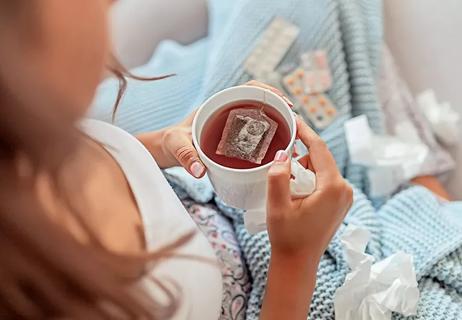Resting, staying hydrated and taking over-the-counter medicine can help you recover quickly

Yikes, we’re in the middle of a “tripledemic.” And you’re feeling under the weather. Now what?
Advertisement
Cleveland Clinic is a non-profit academic medical center. Advertising on our site helps support our mission. We do not endorse non-Cleveland Clinic products or services. Policy
Cases of COVID-19, RSV and the flu are all expected to rise during the winter months, making it more challenging to determine what respiratory virus you may have.
While headlines for the last few years have focused mostly on COVID-19, the flu remains the most common infectious disease in the United States. About 20 to 40 million people in the U.S. will get the flu each year.
You may experience symptoms like:
And if you’re wondering how to tell the difference between the flu and COVID-19 — which have similar symptoms — the only way to know for sure is to get tested. (If you’re experiencing wheezing, that could be a sign of RSV).
If you test positive for the flu or your healthcare provider thinks you have the flu, what can you do to help recover quickly?
Family medicine specialist Daniel Allan, MD, discusses what to do if you have the flu, and how to ease your symptoms and make a quick recovery.
What to do for the flu? Dr. Allan recommends the following remedies and advice on what helps with flu symptoms.
Sounds like a no-brainer, right? But taking it easy and resting helps your body recover. So, pass on that workout session, stay home from work and reschedule any social activities.
Advertisement
Your body releases cytokines, proteins that help your body fight off infections, during sleep. And by resting, your body can devote more energy to repairing itself and fighting the flu. “When it comes to recovering from the flu, less is more,” says Dr. Allan.
Flu symptoms like a fever, vomiting and diarrhea can cause dehydration. So, drink plenty of fluids like water, broth, tea and electrolyte drinks to stay hydrated. Avoid fruit juices, which can be full of sugar, caffeinated beverages and alcohol while you’re sick.
The early signs of dehydration include fatigue, increased thirst, feeling weak and not urinating your normal amount. And if you become dehydrated, it can make your flu symptoms feel worse.
You may also want to use a humidifier, which can help reduce the spread of a virus, and alleviate a cough and nasal congestion.
Another reason why it’s important to stay hydrated? It helps keep the membranes in your nose, eyes and mouth moist, which can prevent bacteria from getting into your body.
“Your hydration needs are actually much higher during an illness than during normal times,” notes Dr. Allan. “How much fluid should you drink? Enough to keep your urine a light yellow or nearly clear.”
If you have muscle aches or body aches, applying a heat pack or using hot water bottles can help alleviate aches. Muscle aches tend to occur when your body uses certain chemicals to fight an infection.
And if you don’t have a fever, taking a steamy shower or hot bath can help ease muscle aches by loosening tight muscles.
So, what do you take for the flu?
Not only can acetaminophen and NSAIDs help reduce a fever, but these medications can also help with headaches or body aches.
If you have a runny or stuffy nose, you can also try a nasal spray or oral decongestant like phenylephrine and pseudoephedrine. But a quick note: People with hypertension or cardiac arrhythmia need to be careful about pseudoephedrine, which can cause negative side effects and drug interactions.
But the most annoying symptom of the flu can be a cough. If you develop one, try a cough suppressant like dextromethorphan. In addition to a cough suppressant, you may want to use an expectorant like guaifenesin to help clear mucus out of your lungs.
“Cough is often the most disruptive symptom, particularly when it comes to sleep,” states Dr. Allan. “If your cough is significantly affecting your sleep, consider contacting your provider, even virtually, for more effective relief.”
Advertisement
The flu can be serious, with about 20,000 to 50,000 people dying from it every year in the U.S. If you experience any of the following symptoms, Dr. Allan recommends heading to the emergency room:
While the flu can typically be taken care of at home, it’s important that you monitor your symptoms and avoid contact with others. You can be contagious for a day before your symptoms start to up to a week after.
If you have questions or concerns, don’t hesitate to talk to a doctor. And to help prevent the spread of the flu in the future, consider getting a flu vaccination every year (and wash your hands regularly, of course!).
And remember, getting the right care helps you and protects those around you.
Advertisement
Learn more about our editorial process.
Advertisement

They can feel similar, but the differences matter — especially if you’re at higher risk for complications

From washing your hands and disinfecting surfaces to boosting your immune health, there are many ways to reduce your flu risk

The two main strains of the flu have a lot in common, but type A causes more cases and more severe illness than type B

Pasteurized milk is considered safe, but there are concerns about avian influenza spreading through raw, unpasteurized milk

The flu can make kids seriously sick, so watch for signs of dehydration and breathing problems

Tamiflu can shorten your child’s illness and even help prevent the flu

You may be spreading the flu virus before your symptoms start and up to a week after

While it typically starts in October, vaccine effectiveness can affect its duration and severity

Wearing a scarf, adjusting your outdoor activities and following your asthma treatment plan can help limit breathing problems

Your diet in the weeks, days and hours ahead of your race can power you to the finish line

When someone guilt trips you, they’re using emotionally manipulative behavior to try to get you to act a certain way